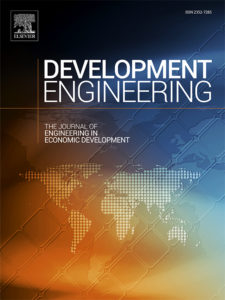Development Engineering Journal Special Issue on Geospatial Analysis for Development

In low-resource settings, data scarcity often limits practitioners’ ability to respond rapidly and effectively to global development challenges. Geospatial data–now abundantly available with the proliferation of satellites, sensors, and mobile phones–have immense potential to fill these gaps when combined with analytical tools to process such data, and with “ground truth” data from surveys, administrative data, and other sources. Geospatial analysis allows for real-time measurement of trends in agriculture, health, poverty, transportation, water and sanitation, humanitarian relief, and other critical sectors. However, applications are underutilized in global development due to communication and knowledge gaps between researchers, practitioners and policymakers, and the perceived complexity of geospatial data.
The Journal Development Engineering is excited to announce a Special Issue (SI) to address this gap by publishing the latest research that leverages geospatial analysis for global development, including papers that use remote sensing to study human economic activity and development trends, such as manuscripts analyzing Nighttime Light datasets. The SI seeks to promote geospatial data and related analytical tools in global development. To that end, we will publish manuscripts that describe and use cutting-edge tools, datasets, and applications of geospatial data, including papers presented at CEGA’s 2020 Geospatial Analysis for Development (Geo4Dev) Symposium and Workshop.
We invite submissions that address these and related topics:
- Studies that use Nighttime Light data sets for studying human economic activity and development trends
- Use cases of other geospatial data – including data from satellites, sensors, and mobile phones – for monitoring poverty and economic development
- Studies that use geospatial data to analyze the implications of COVID-19 for economic activity and other indicators of development
- Impact evaluations that use geospatial analysis, including but not limited to studies that use geospatial data to assess impacts of infrastructure projects or humanitarian relief
- Comparative studies on alternative sources of geospatial data, or studies that compare geospatial data with survey data, administrative data or other data sources.
- Research that highlights tools and technologies that increase the accessibility and ease at which geospatial data can be used
Submissions will be accepted through November 1, 2021 (previously July 1st, 2021). Thanks to Elsevier’s amended policies for 2021, all submissions will be eligible for full fee waivers. We will fast-track the peer review process (i.e., implement a rapid review process) for papers presented at CEGA’s 2020 Geospatial Analysis for Development (Geo4Dev) Symposium and Workshop. To submit a manuscript for review, please click here. If you have a question about the applicability of a given topic to the SI, please reach out to Berber Kramer (b.kramer@cgiar.org).
***
Development Engineering: The Journal of Engineering in Economic Development is an open-access, interdisciplinary journal applying engineering and economic research to the problems of poverty. Published studies must present novel research motivated by a specific global development problem. The journal, hosted by the USAID-funded Development Impact Lab (DIL) at UC Berkeley, serves as a bridge between engineers, economists, and other scientists involved in research on human, social, and economic development.

